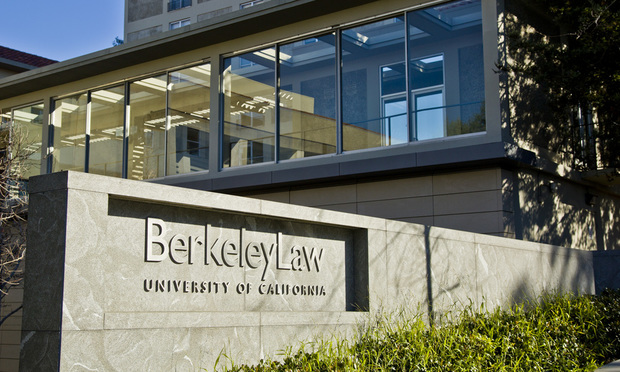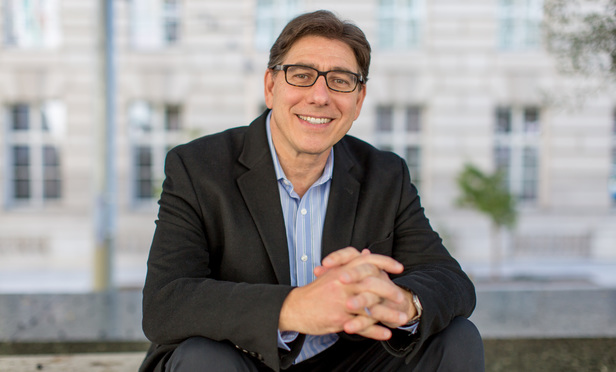In Latest US News Rankings, Berkeley Law Ticks Up 1 Spot, UC Davis Falls 7
Chapman University Dale E. Fowler School of Law was the big winner among the state's law schools in the rankings released Tuesday. The Orange County school surged up 21 spots to land at No. 111.
March 17, 2020 at 07:00 PM
6 minute read
The original version of this story was published on Law.com
 University of California at Berkeley. (Photo: Jason Doiy/ALM.)
University of California at Berkeley. (Photo: Jason Doiy/ALM.)
While it was largely business as usual among the top schools in the latest law school rankings from U.S. News & World Report, there was some significant movement among the California schools on the list.
Yale Law School retained its stranglehold on the top spot, with Stanford Law School and Harvard Law School repeating at Nos. 2 and 3, respectively. The only change among the top five schools was Columbia Law School moving up one slot to tie with the University of Chicago Law School at No. 4.
The University of California, Berkeley School of Law joined Northwestern University Pritzker School of Law with both schools moving up one spot to tie at No. 9.
"I think this recognizes the breadth of our excellence in so many different fields," wrote Berkeley Law Dean Erwin Chemerinsky in a blog post celebrating what he called some good news in "a time of great stress and uncertainty."
"Although I recognize that rankings are problematic, altogether these rankings are a reflection of our being a terrific law school," Chemerinsky wrote. "These rankings are a result of the enormous hard work of our faculty, staff, and students. They also are a product of the essential support from our alumni."
In the Golden State, Chapman University Dale E. Fowler School of Law saw the biggest gains. The Orange County school surged up 21 spots to land at No. 111 in the rankings released Tuesday.
Earlier this year, the school boasted that Chapman Law saw the largest jump in the credentials of incoming students of any law school in the U.S. from 2016 to 2019, with the median LSAT score increasing from 155 to 158, and the median undergraduate GPA increasing from 3.24 to 3.49.
"Our progress is a testament to the strength and diversity of our student body and the great work being done by the faculty and staff here at the law school," said Chapman Law Dean Matthew Parlow said at the time. "I'm proud of the many ways our school continues to excel among law schools nationally."
The University of California, Davis School of Law saw the biggest drop among California schools on the list, falling seven spots to No. 38.
A spokesperson for the school and Dean Kevin Johnson weren't available for comment by the time of this story.
It remains to be seen whether the influential rankings will generate much reaction among the legal academy this go around. They are being released at a time when every law school in the country is struggling to adapt to the COVID-19 pandemic and virtually all 200 schools are moving classes online. Typically, deans at schools with large moves up or down the rankings either trumpet that improvement or offer explanations or reactions to major drops. But the rankings may well be overshadowed by the push to keep law schools functioning virtually. Unlike in years past, early versions of the rankings did not leak on legal blogs ahead of the official publication.
In San Francisco, the University of California Hastings Dean David Faigman noted the incongruity in a message to all students, faculty, and staff.
"Ordinarily, this is the time of year when I write regarding news of our rankings as tabulated by U.S. News. These, however, are no ordinary times," Faigman wrote. "Indeed, it feels surreal to even nod toward a highly contested ranking formula designed by a private news organization. Yet, at the same time, perhaps a little normality is needed just now."
 David Faigman, Hastings College of the Law (Jason Doiy)
David Faigman, Hastings College of the Law (Jason Doiy)The school reversed a recent downward trend moving up three spots, from 62 to 59.
Faigman indicated that he expects the school's rankings to improve further in the coming year since this year's rankings are based on 2018 bar passage and employment statistics and the school has since improved bar passage rates by 20 percentage points and employment by 11.2%.
Elsewhere in the state, the University of Southern California Gould School of Law was up one spot to No. 18, the University of California, Irvine School of Law was down four to No. 27, Pepperdine University School of Law was up four spots to no. 47, the University of San Diego School of Law was up three spots to No. 83, and Santa Clara University School of Law fell three spots to No. 107. Holding steady were the University of California at Los Angeles School of Law at No. 15 and Loyola Law School, Los Angeles at No. 62. The state's remaining law schools stayed among the unranked tier of schools.
Among the top 50 schools nationally, Fordham University School of Law was the big winner.
The Manhattan law school rocketed up 12 spots to land at No. 27 in the closely watched rankings—by far the largest jump among the top 50 schools.
It appears that Fordham's impressive gain is due largely to improved employment outcomes for the class of 2018. More than 74% of that class had jobs at graduation, and nearly 88% were employed at graduation—up from 62% and 77% last year, respectively.
"We judge ourselves more by the accomplishments of our students, faculty and alumni than by an external ranking, but I am pleased to see the excellence of our law school recognized," said Fordham law dean Matthew Diller. "Our rise was fueled by strong employment numbers—both at graduation and 10 months after, as well as increases in reputation among the bench and bar and strong admissions. The school also did well in a broad range of specialty areas."
U.S. News added four new specialty rankings to its offerings this year to the existing seven—business and corporate law, contracts and commercial law, criminal law and constitutional law. The specialty rankings are calculated by survey responses from legal academics.
Columbia snagged the top spot in both the business law and contracts categories, while NYU took the No. 1 ranking for criminal law. Yale topped the list for constitutional law.
The rankings released Tuesday did not include the much-discussed new scholarly impact ranking, which U.S. News has said it plans to release later this year. Legal academics have fiercely debated the merits of the proposed new ranking, which will be based on the citations of faculty scholarship.
This content has been archived. It is available through our partners, LexisNexis® and Bloomberg Law.
To view this content, please continue to their sites.
Not a Lexis Subscriber?
Subscribe Now
Not a Bloomberg Law Subscriber?
Subscribe Now
NOT FOR REPRINT
© 2025 ALM Global, LLC, All Rights Reserved. Request academic re-use from www.copyright.com. All other uses, submit a request to [email protected]. For more information visit Asset & Logo Licensing.
You Might Like
View All
Assessing the Second Trump Presidency’s Impact on College Sports


LSAT Administrator Sues to Block AI Tutor From Using ‘Famous, Distinctive’ Test Prep Materials
3 minute readTrending Stories
- 1Treasury GC Returns to Davis Polk to Co-Chair White-Collar Defense and Investigations Practice
- 2Decision of the Day: JFK to Paris Stowaway's Bail Revocation Explained
- 3Doug Emhoff, Husband of Former VP Harris, Lands at Willkie
- 4LexisNexis Announces Public Availability of Personalized AI Assistant Protégé
- 5Some Thoughts on What It Takes to Connect With Millennial Jurors
Who Got The Work
J. Brugh Lower of Gibbons has entered an appearance for industrial equipment supplier Devco Corporation in a pending trademark infringement lawsuit. The suit, accusing the defendant of selling knock-off Graco products, was filed Dec. 18 in New Jersey District Court by Rivkin Radler on behalf of Graco Inc. and Graco Minnesota. The case, assigned to U.S. District Judge Zahid N. Quraishi, is 3:24-cv-11294, Graco Inc. et al v. Devco Corporation.
Who Got The Work
Rebecca Maller-Stein and Kent A. Yalowitz of Arnold & Porter Kaye Scholer have entered their appearances for Hanaco Venture Capital and its executives, Lior Prosor and David Frankel, in a pending securities lawsuit. The action, filed on Dec. 24 in New York Southern District Court by Zell, Aron & Co. on behalf of Goldeneye Advisors, accuses the defendants of negligently and fraudulently managing the plaintiff's $1 million investment. The case, assigned to U.S. District Judge Vernon S. Broderick, is 1:24-cv-09918, Goldeneye Advisors, LLC v. Hanaco Venture Capital, Ltd. et al.
Who Got The Work
Attorneys from A&O Shearman has stepped in as defense counsel for Toronto-Dominion Bank and other defendants in a pending securities class action. The suit, filed Dec. 11 in New York Southern District Court by Bleichmar Fonti & Auld, accuses the defendants of concealing the bank's 'pervasive' deficiencies in regards to its compliance with the Bank Secrecy Act and the quality of its anti-money laundering controls. The case, assigned to U.S. District Judge Arun Subramanian, is 1:24-cv-09445, Gonzalez v. The Toronto-Dominion Bank et al.
Who Got The Work
Crown Castle International, a Pennsylvania company providing shared communications infrastructure, has turned to Luke D. Wolf of Gordon Rees Scully Mansukhani to fend off a pending breach-of-contract lawsuit. The court action, filed Nov. 25 in Michigan Eastern District Court by Hooper Hathaway PC on behalf of The Town Residences LLC, accuses Crown Castle of failing to transfer approximately $30,000 in utility payments from T-Mobile in breach of a roof-top lease and assignment agreement. The case, assigned to U.S. District Judge Susan K. Declercq, is 2:24-cv-13131, The Town Residences LLC v. T-Mobile US, Inc. et al.
Who Got The Work
Wilfred P. Coronato and Daniel M. Schwartz of McCarter & English have stepped in as defense counsel to Electrolux Home Products Inc. in a pending product liability lawsuit. The court action, filed Nov. 26 in New York Eastern District Court by Poulos Lopiccolo PC and Nagel Rice LLP on behalf of David Stern, alleges that the defendant's refrigerators’ drawers and shelving repeatedly break and fall apart within months after purchase. The case, assigned to U.S. District Judge Joan M. Azrack, is 2:24-cv-08204, Stern v. Electrolux Home Products, Inc.
Featured Firms
Law Offices of Gary Martin Hays & Associates, P.C.
(470) 294-1674
Law Offices of Mark E. Salomone
(857) 444-6468
Smith & Hassler
(713) 739-1250







